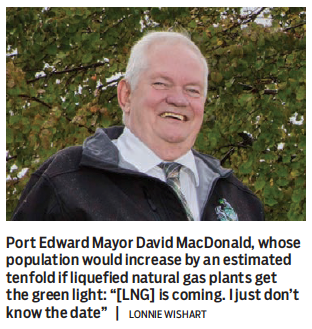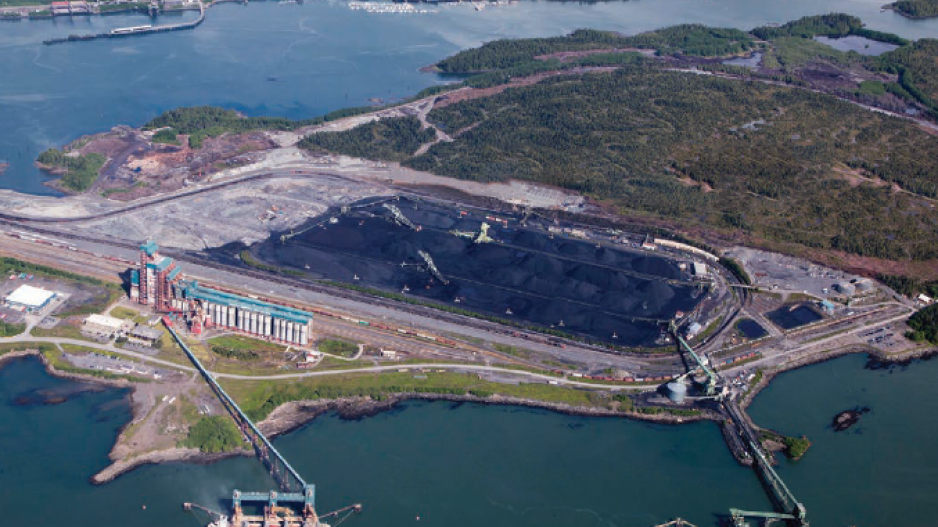In less than two decades Port Edward shed two-thirds of its population and all of its major employers. It has no hospital or recreation centre, nearly lost its only school and appeared headed for ghost-town status.
But this rocky 69-square-mile footprint on B.C.’s northwest coast is now ground zero for B.C.’s dreams of becoming a global exporter of liquefied natural gas (LNG).
If everything lines up, Malaysian state-owned Petronas will start construction this year on a multibillion-dollar LNG terminal that could increase Port Edward’s population tenfold and trigger a development boom.
“It is coming. I just don’t know the date,” said David MacDonald, the part-time security guard who has been Port Edward’s mayor for the past 10 years. A longtime resident, MacDonald witnessed the closure of the town’s Skeena pulp mill 14 years ago and the crash in the area’s commercial fishery, which together once served a district population of 2,000.
His town has already felt the financial quake of Petronas’ proposed $11 billion Pacific NorthWest LNG (PNW) plant and marine terminal, which is still awaiting environmental approval. The proposed $36 billion project includes a large pipeline extension from B.C.’s northeast gas fields and the drilling of up to 1,200 gas wells.
PNW is requesting to export 19.68 million tonnes of LNG annually for 25 years. To date, the National Energy Board (NEB) has issued export licences to three LNG proponents, most recently to LNG Canada (Shell Canada and co-venture partners) in February.
As well, the NEB is assessing a BG Group proposal for an LNG plant at Prince Rupert and a proposal by Imperial Oil (TSX:IMO) and ExxonMobil Canada, which are assessing a site in the northeast.
Port Edward’s tiny four-person district office has been buzzing since PNW started scouting sites in the area three years ago. Staff completed an official community plan that outlines robust development well into the future and soon had bidders.

Port Edward has already sold a large chunk of land to the PTI Group to develop a massive work camp, the first of a series of camps that could house up to 5,000 construction workers.
Another 11 acres was sold to energy giant AltaGas (TSX:ALA) for a planned LNG or propane export terminal. The town rallied to build a new elementary school for its remaining students and a developer has staked out land for a 100-home subdivision.
On September 2, two dozen residents of the Port Edward trailer court began leaving after a year long eviction order from the owner, Stonecliff Properties, which plans a major expansion on the site.
In all, a trio of development applications, from Stonecliff, Catla Enterprises and Alberta-based Odyssey Homes, would create a 370-unit trailer park, 400 other homes, a strip mall and a hotel. A new trucking company has opened, to serve the port at nearby Prince Rupert.
“Presently in Port Edward there are no hotels or motels and very limited options for housing for the construction workforce,” according to a statement from Odyssey.
“Port Edward is currently ill equipped to manage the anticipated population increase over the next six to 10 years.”
The first work camp will be about a mile from what passes as downtown Port Edward and will be linked by a new $25 million ring road, MacDonald said.
Under an agreement, Petronas will provide Port Edward with $150 million in sustained funding for the next 25 years.
That money represents a 150% increase in the district’s current annual budget and will be invested in infrastructure upgrades, the mayor said.
According to MacDonald, the majority of Port Edward residents support the LNG proposals and even the local Lax Kw’alaams Band, whose opposition included rejection this year of a $1.1 billion benefits offer from Petronas, appears to be softening its stance. The preferred LNG site, on Lelu Island, would provide the district with property taxes and about 200 permanent jobs once complete.
“Is everybody in favour? No,” the mayor said, “but most people think it is the best thing for Port Edward.”
Like many others, MacDonald does not expect a ruling from the Canadian Environmental Assessment Agency on the Petronas plant until after the October 18 federal election. •




